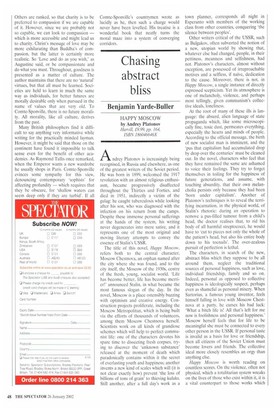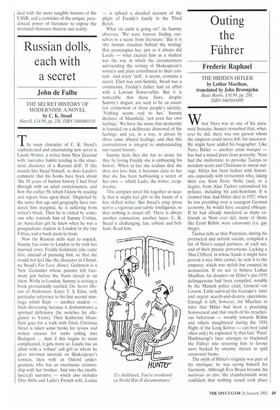Chasing abstract bliss
Benjamin Yarde-Buller
HAPPY MOSCOW by Andrey Platonov Harvill, £9.99, pp. 164, ISBN 186046646X Andrey Platonov is increasingly being recognised, in Russia and elsewhere, as one of the greatest writers of the Soviet period. He was born in 1899, welcomed the 1917 revolution with an almost religious enthusiasm, became progressively disaffected throughout the Thirties and Forties, and died in 1951, indirectly a victim of the gulag: he caught tuberculosis while looking after his son, who was diagnosed with the infection on his return from the camps. Despite these immense personal sufferings at the hands of the system, his writing never degenerates into mere satire, and it represents one of the most original and moving literary attempts to convey the essence of Stalin's USSR.
The title of this novel, Happy Moscow, refers both to the central character, Moscow Chestnova, an orphan named after the city where she was found, and to the city itself, the Moscow of the 1930s, centre of the fresh, young, socialist world. 'Life has become better, life has become merrier!' announced Stalin, in what became the most famous slogan of the day. In the novel, Moscow is a place ostensibly buzzing with optimism and creative energy. Construction projects proliferate, including the Moscow Metropolitan, which is being built via the efforts of thousands of volunteers, among them Moscow Chestnova herself. Scientists work on all kinds of grandiose schemes which will help to perfect communist life: one of the characters devotes his spare time to dissecting fresh corpses, trying to discover the 'unknown substance' released at the moment of death which paradoxically contains within it the secret of everlasting youth and happiness; another invents a new kind of scales which will (it is not clear exactly how) prevent 'the loss of billions of tons of grain' to thieving kulaks. Still another, after a full day's work as a town planner, corresponds all night in Esperanto with members of the working class from other countries, conquering 'the silence between peoples'.
Other writers critical of the USSR, such as Bulgakov, often subverted the notion of a new, utopian world by showing that, whatever else had changed, people, in their pettiness, meanness and selfishness, had not. Platonov's characters, almost without exception, are possessed of irreproachable motives and a selfless, if naive, dedication to the cause. Moreover, there is not, in Happy Moscow, a single instance of directly expressed scepticism. Yet its atmosphere is one of melancholy, violence, and perhaps most tellingly, given communism's collective ideals, loneliness.
At the root of many of these ills is language: the absurd, alien language of state propaganda which, like some microscopically fine, toxic dust, permeates everything, especially the hearts and minds of people. According to the official message, the birth of new socialist man is imminent, and the 'pus that capitalism had accumulated drop by drop over the centuries' must be cleaned out. In the novel, characters who feel that they have remained the same are ashamed to voice their feelings. They try to forget themselves in toiling for the happiness of future generations, and assume, with touching absurdity, that their own melancholia persists only because they had been 'born under capitalism'. Another of Platonov's techniques is to reveal the terrifying incarnation, in the physical world, of Stalin's rhetoric: during an operation to remove a pus-filled tumour from a child's head, the doctor realises that, to rid his body of all harmful streptococci, he would have to tut to pieces not only the whole of the patient's head, but also his entire body down to his toenails'. The over-zealous pursuit of perfection is lethal, The characters, in search of the new, abstract bliss which they suppose to be all around them, neglect the traditional sources of personal happiness, such as love, individual friendship, family and so on. Indeed, personal as opposed to collective happiness is ideologically suspect, perhaps even as shameful as personal misery. When Sartorius, a famous young inventor, feels himself falling in love with Moscow Chestnova at a party, he curses his bad luck: 'What a bitch life is! All that's left for me now is foolishness and personal happiness.' Moscow herself feels that for life to be meaningful she must be connected to every other person in the USSR. If personal taste is invalid as a basis for love or friendship, then all citizens of the Soviet Union must become lovers and friends. The collective ideal more closely resembles an orgy than anything else.
Happy Moscow is worth reading on countless scores. On the violence, often not physical, which a totalitarian system wreaks on the lives of those who exist within it, it is a vital counterpart to those works which deal with the more tangible horrors of the USSR, and a reminder of the unique, paradoxical power of literature to expose the mismatch between rhetoric and reality.



















































































 Previous page
Previous page